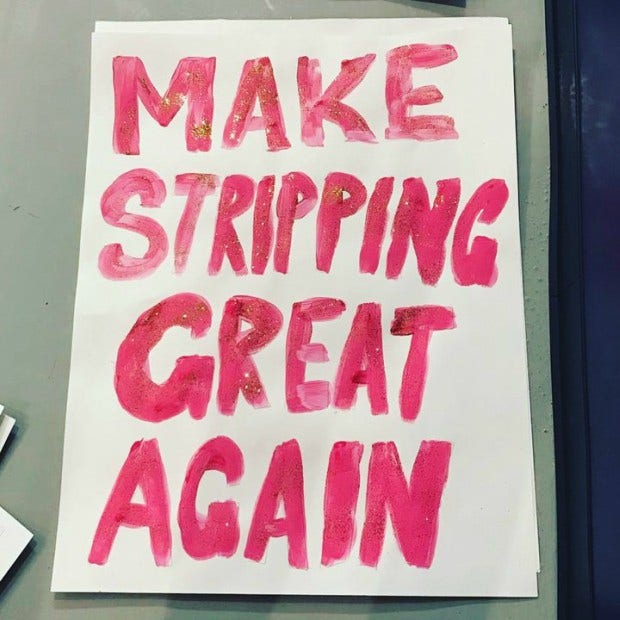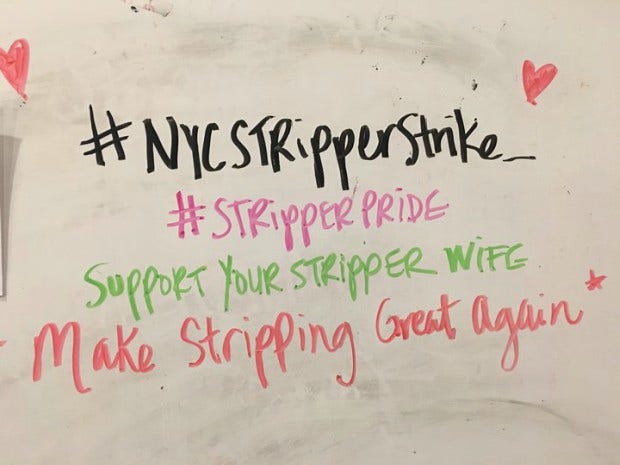A Look Inside The History-Making NYC Stripper Strike
This is a story about stripper pride.
 courtesy of the author
courtesy of the author This is a story about anger. This is a story about racism, twerking for change, single mothers, financial struggle, exhaustion, resistance, extortion, stigma, sex work, alienation, seeing the future and the past, knowing all the ways we are being screwed and getting dressed up anyway. Because we have rent, kids, student loans, a grandmother with dementia.
This is a story about stripper pride.
Starlet’s Gentleman’s Club is located in Woodside, an industrialized part of Queens with no 7-11s or streetlights nearby. It’s past the old, modest homes with rusty white bars on windows and quaint underground driveways, past the very new-money condos and Mercedes SUVs covered in several inches of fresh snow.
It’s January, and there’s a blizzard. I’m wearing inappropriate shoes when I arrive from Los Angeles. I try not to slip on ice as I stomp slowly up a long ramp toward two massive security guards. According to the strippers in the Bronx I spoke to earlier, P. Diddy plans to celebrate his birthday here, and it’ll be a lit night if so. But I didn’t come to Starlet’s for P. Diddy’s birthday.
I’m here because of “Gizelle Marie,” a gorgeous half-black, half-Hispanic stripper with a shy smile, warm eyes, and Kardashian-like curves. She’s not at Starlet’s tonight because she says she was recently fired for speaking out against unfair labor conditions. She says she’s been fired from two other clubs for similar reasons. She asked me to come here and observe.
I’ve been a stripper for over 25 years, and I’m one of the original dancers who fought our labor war and won in San Francisco to form SEIU Local 790: The Exotic Dancer’s Alliance.
I’m familiar with the politics of strip club settings: the low lights and pretend party vibe concealing the vaguely brutal transactions and crude discriminatory policies, the totally arbitrary house fees or stage fees that grow and grow, enforcing a five- to eight-hour shifts, policing how we are touched and where, body-shaming, fat-shaming, clubs stealing 60 percent of the cost of private dances, mysterious fines and fees for lateness that cost up to several hundred dollars, misclassifying strippers as independent contractors.
I know these things like I know how to spin on a pole and fall like water while maintaining eye contact with a moneyed man.
It was 1996. We did the one thing no strip club owner believed strippers would ever do: We unified.
This is what happened at Starlet’s: Instead of using Instagram to draw attention to the strippers already dancing at their clubs, promoters used it to procure influencer “It” girls: models with upward of 50,000 followers. Based on their followers and looks, promoters hired them as bartenders and gave them a stage show where they danced in skimpy outfits for a money shower: fans tossing bills in the air. Their spot was at 3:15 a.m. on Sunday. But soon, the bartenders were simply dancing along with the strippers while at a bar below the stage, meaning they were now in direct competition with strippers ― without having to do any of the actual “dirty work” or suffering the stigma that comes with the job title.
Resentments broiled.
According to Gizelle Marie, promoters and owners also began hiring and firing girls along racially biased lines. They began to control the way strippers were seen and who they were seen by, often banning darker-skinned women from working certain nights. Promoters in other clubs wouldn’t allow strippers with darker skin color to give dances in VIP areas, or they would not allow certain women of color to have shifts at all.
[Editor’s note: Starlet’s Gentleman’s Club did not respond to HuffPost’s request for comment.]
That’s when Gizelle Marie and a core group of other strippers of color launched an Instagram campaign called #NYCStripperStrike.
They used social media to complain about the outsourcing to management and other unfair labor practices. As their movement gained momentum, it gave a clear, loud voice to women of color who dance in the clubs.
Around this time, I reached out to Gizelle Marie and asked if I could help.
Club owners behave as though strippers are a disposable, powerless workforce. That they can lose every single class-action lawsuit, write a check, change the name of the fees and punish the workers, intimidating them from organizing. But without strippers, you have no strip club.
Sex work ― and stripping in particular ― is an occupation where women make more than men regardless of our education level, experience or immigration status. Strip club owners will never stop trying to take that money and control the women who do all the work without offering basic benefits. Yet, the industry survives solely because of women’s innate desirability in a system that refuses to legitimize us as workforce no matter how hard we work, how many illegal house fees we pay, or how many class-action lawsuits we win. And strippers are a vulnerable, largely immigrant workforce, often supporting several kids or family members with their tips.

The security guys outside Starlet’s check my ID and pat me down, front and back. Twice. They go through my purse. Inside the door, like at a movie theater, a man collects $20. One more security person rummages through my purse, then I’m free to walk the long, cold corridor past an empty buffet table.
Around the corner is a circular bar with at least half a dozen stations decorated with beautiful bartenders, the so-called “Startenders.” They visibly outnumber the strippers as they lounge along the bar, taking selfies and short videos of themselves posing and vaping. Not one of them is mixing a drink or wiping the counter. No barbacks scoop ice.
On stage, two strippers flutter like angry butterflies to the beats of Future, Gucci Mane, and Cardi B, sticking it all out, hoping for a money shower. It takes effort to ball up my dollars so they can pass the bartenders and land on the stage. I get a lap dance from a Colombian girl, then leave.
The next day, half a dozen local strippers and Gizelle Marie arrive at a private law office near Bryant Park. They have vastly different experiences and complaints; they work at different clubs and have diverse lifestyles. Several dancers of color speak out. A topic that comes up: What do we call ourselves ― sex workers, strippers, hoes? And how do we promote our campaign to include other cities and allies?
“We all deserve change,” Gizelle Marie says calmly.
She proposes that strippers and bartenders obtain a license or sheriff’s card to work. They use this method in some clubs in Las Vegas, Arizona, and Atlanta. The card means a stripper is considered a sole proprietor instead of an employee. But it can cost up to $500 or more for a sheriff’s card, and getting one often requires fingerprinting, background checks and sufficient immigration documentation. This leaves undocumented women at risk. The room is divided on this issue.
The things that were discussed and demands that are on the table are as follows:
- Do away with house fees, stage fees, or any “mandatory” tipping.
- Stop all racist hiring and firing policies. Stop discriminating against darker-skinned black women by denying them certain shifts or firing them.
- Allow strippers to be strippers. Allow bartenders to be bartenders. They are different jobs. It’s that simple.
- Stop all body-shaming policies. Don’t coerce women into plastic surgery or require them to work out and lose weight.
- Stop coercing strippers to sign bizarre contracts that control their behavior inside and outside the strip club. For example, dancer may be forced to sign a prostitution liability document stating they agree not to meet clients outside of work.
- Stop forcing strippers to do your marketing for you in exploitive and invasive ways, like offering dancers a discount on their house fee in exchange for clients’ phone numbers.
- Get rid of House Moms, the hired female staff that set up shop in the dressing room to provide everything from Q-tips to emotional support to home-cooked meals. They charge fees for all items. They are often the ears and eyes of management. We can get our own supplies. We have moms.
- Get us real security. We will tip them. The security staff available to us now often polices us by searching our bags for condoms and drugs instead of protecting us.
- Stop mandatory tip-out for the hosts/dance counters/floor people. They have many titles. But they do nothing for us and don’t deserve our tips. The millionaire strip club owner needs to pay them a living wage. It’s not our responsibility. The one person in the room who deserves our tips is the DJ because he plays our music and arranges the lights. He contributes to our show! Tip this guy.
- Give us all rights and treat us as employees. We need to fight the misclassification of employment claim to force management to the bargaining table.
I offer help writing petitions or any other necessary documents, as well as access to all of my legal contacts from my involvement in a previous union effort ― including stripper-turned-labor lawyer Kristina Zinnen, who offers to counsel and help as well. We plot future Stripper Pride Marches in San Francisco and New York, where allies and strippers could stand together to foster unity and support, visibility and change.

Over banana chips and guacamole at a nearby restaurant, I listen to Gizelle Marie laugh. We praise each other’s accomplishments. Huddled inside while a storm rages outside, I am reminded of a labor war that began with a conversation as friends and co-workers ate potstickers next door to the Lusty Lady in San Francisco. It was 1996. We did the one thing no strip club owner believed strippers would ever do: We unified. And although I’m proud of the mark we made on the stripper map from 1996-1998, it’s not enough. In fact, it’s barely a beginning.
We dared to care about one another just like these women. And for a moment, in this café, I am warm.
Antonia Crane is the author of the memoir, Spent. She is a writing instructor, stripper, and performer in Los Angeles.

